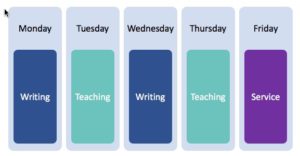As you close your laptop on turning in grades, set up your email auto-responder so that students know you are unreachable and dream about all those projects that you’re going to finish over the break, it might be time for a little reality check.
Let me guess: you have a list of almost-done projects that you are relying on the break to complete. Revise-and-resubmits. Drafts that need to be submitted. Reviews you’ve promised. And if there’s time, a jump-start on next semester’s classes.
But the reality is that after the chaos of the end of the semester, what you really need is a break. At the end of every semester, you think: I’m going to get all this writing done because I’ll finally have time! And every break you are too burnt out and exhausted to even get half of what you were hoping to accomplish to the finish line.
Sigh.
First, please let me say: You need a break. You need to disconnect from academia completely. This is essential. You won’t get momentum to complete anything if you don’t.
Second, part of the reason that you have these accumulated writing projects is that you are holding on to some myths about how to make writing a bigger part of your career. This post is about breaking down those myths and getting a good dose of reality. This will get you set up to get more writing done and really enjoy your break.
So let’s get into the five myths about getting writing done that you need to stop believing, like, yesterday.

Myth #1: You need inspiration to write
I used to think this, but that thought went right out the window when I had my first baby. Pre-baby I thought that the planets needed to be aligned, the time of day needed to be perfect, and I needed to be in the right mood to write. Having a child showed me there was hardly ever going to be a time when I was “inspired,” so I had to figure out another way.
Reality: You need a routine
The way to bust this myth is to get yourself a writing system. You don’t need huge blocks of time and you don’t need to write every day, but you do need a sustainable system that you can re-start again and again, without guilt.
Myth #2: You need to work weekends and nights
Again, after becoming a mom the option of working weekends and nights was gone. And there was no “getting up before the kids,” either, since for literally years my son woke up at 4:00 a.m. For the day.
Also, this image of the dedicated scholar burning the midnight oil is, well, just not us (it’s not me, anyway). That person is male, wearing a tweed jacket with elbow patches, glasses at the end of his nose. Someone else is watching that imaginary person’s kids, and making him breakfast. I’m ready to let go of that ridiculous standard in academia that says you have to work all the time.
Reality: You need to have a concrete plan BEFORE the semester starts
If you want to corral your work into working hours, you need a plan. One way that I do this is by “stacking” my schedule. You have so many moving parts that make up your work as an academic. Teaching, research, and service doesn’t quite begin to describe it all. But to show you how stacking works, we’ll just take those three broad categories.

I don’t know about you, but I’m a person who would let lesson planning fill up an entire day if I could: making handouts, inventing interactive activities, finding the perfect readings. But you have to draw the line somewhere. I started deliberately planning my courses for Tuesday/Thursday mid-morning, then forcing myself to prep the lessons in the block of time before class. I also scheduled student meetings and office hours during those days, so that all my interactions with students happened on T/Th. That freed up my Mondays and Wednesdays for research and writing, and left me with Fridays for service.
Now, depending on your own institutional situation and where you are in your career you may not have the flexibility to achieve this, but I encourage you to be creative and see if you can get close.
Myth #3: You need big blocks of time
Maybe you can’t achieve the kind of ”stacking” of your schedule suggested above. Does that mean that you can’t find time to write? Nope!
Reality: You need to use your “tiger time”
I borrowed the term “tiger time” from entrepreneur Amy Porterfield who uses it to describe those high-energy, take-over-the-world times of day. I describe how to identify and use your tiger time in the video below, but the big idea is to schedule shorter blocks of writing time (1-2 hours) during your best, most focused times of day.
You’ll get more writing done by being sure to hit those high-energy times than by staring at the blinking cursor when you are too exhausted to think.
Myth #4: You’re too busy
OK, ok. You are DEFINITELY too busy. You have way too much on your plate, and you need to quit stuff. But it doesn’t have to feel this way.
Reality: Your activities are not aligned
In order to feel less frazzled, you need to make your activities more cohesive. That involves finding focus and aligning all of your activities with that focus. For example, if you are giving undergraduate courses that are not exactly in line with your research area, how could you change the class activities and focus to better align? Similarly, can you line up your service responsibilities into areas that more directly apply to your research interests? Whatever you can’t align, make a plan to quit.
Myth #5: You don’t have enough time
For reasons we’ve already covered here, you feel like you don’t have enough time. I get it, and I felt it too. Then I figured out how to focus, pre-plan, and align my activities.
Reality: It’s not (only) about time
Anyone who has had the great fortune to be granted a sabbatical can tell you: writing more is not just about time. It’s about strategy, focus, and planning.
I didn’t start out my career with those skills in place, though. I learned them through trial and (lots of) error. But I truly don’t think YOU should have to learn them that way. Get my 10 best tips for finding time to write in this PDF download and show your writing some love:
[convertkit form=5257702]






